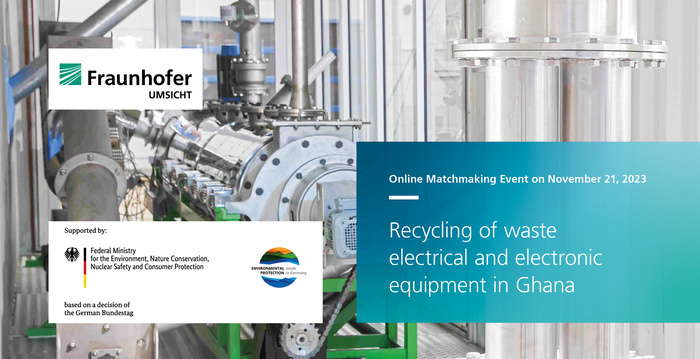Recycling of waste electrical and electronic equipment (WEEE) in Ghana

Online matchmaking event on 21 November 2023
How can the practice of recycling WEEE in Ghana be improved?
This question will be addressed in a matchmaking on 21 November 2023, organised by Fraunhofer UMSICHT in cooperation with BlackForest Solutions and German RETech Partnership, with Ghanaian recyclers and German technology providers focused on the specific needs.
A formal recycling sector is emerging in Ghana that seeks to process WEEE in an environmentally sound manner and invests in processing technologies. The facilities available in Ghana have so far been limited to manual disassembly and partial mechanical shredding and sorting. Fractions such as printed circuit boards, plastic housings, screens, cable granulate or batteries are produced. However, there are only a limited number of local customers for these fractions, such as copper smelters or plastics recyclers. Therefore, most waste fractions containing precious metals are exported. This places tight limits on local value creation and the revenues of local processing companies.
This is where the current project comes in: an innovative thermochemical processing method developed at Fraunhofer is to supplement manual and mechanical separation as an additional downstream technology in Ghana. The primary goal is to bring the metals contained in the WEEE into efficient recycling processes. At the same time, waste containing environmentally harmful substances, e.g. flame-retardant plastic housings, should be disposed of safely.
Local value creation could be increased many times over through such a new, locally operated downstream process. On the one hand, income opportunities for the local population would increase, and on the other hand, environmental and health hazards would decrease.
In order to meet the specific needs of local recyclers, a matchmaking event between Ghanaian recyclers and German technology providers will take place on 21 November 2023 from 1 to 3 pm.
The project, entitled EAG2-Rec, is funded by the German Federal Ministry for the Environment as part of the Export Initiative for Environmental Protection.